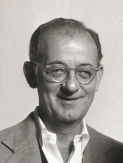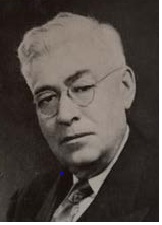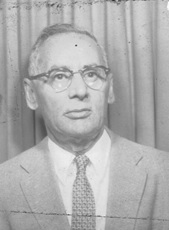Prominent Jews from Ungheni

|
I.A.L. Diamond – Hollywood screenwriter.
Born in 1920 in Ungheni, as Itec (Itzek) Domnici, to David and Elca (Waldman) Domnici, he emigrated with his mother and sister to the United States (New York) in 1929.
He was known as “Iz,” and his initials stood for "Interscholastic Algebra League", a prize he won while attending Boys' High School in Brooklyn.
After graduating from Columbia University in 1941, he went to Hollywood and eventually worked as a screenwriter from 1941-88, often collaborating with Billy Wilder.
His credits include: Love in the Afternoon, 1957, Some Like It Hot, 1959, The Apartment, 1960, One, Two, Three, 1961, Irma La Douce, 1963, Kiss Me, Stupid, 1964,
The Fortune Cookie, 1966, Cactus Flower, 1969, The Private Life of Sherlock Holmes, 1970, Avanti, 1972, The Front Page, 1974, Fedora, 1978, Buddy Buddy, 1981.
His awards include: Academy award 1960 (shared with Wilder for “The Apartment,” N.Y. Film Critics award 1960, Writers Guild award 1957, 59, 60. In 1980, both Diamond and Wilder
received the Writers Guild of America's Laurel Award for career achievement in screenwriting. Diamond married Barbara Bentley in 1945 and they had a son and a daughter.
He died Apr. 21, 1988 after suffering with multiple myeloma, and was buried at sea.
Sources:
Diamond, Isidore. (2016). In Marquis Who's Who (Ed.), Who was who in America: with world notables (26th ed.).
New Providence, NJ: Marquis Who's Who LLC. Retrieved from CredoReference database [proprietary].
Diamond, I.A.L. (2017) Wikipedia
Photo from Wikipedia
|
Additional sources:
“I.A.L. Diamond Is Dead at 67; Won Oscar for 'The Apartment'’– Obituary”: New York Times, April 22, 1988
“The Making of Some Like It Hot” – documentary –Marilyn Monroe Video Archives, 2006
[with footage of I.A.L. Diamond and his wife, Barbara] NOTE: Reveals that Diamond was the author of the movie’s famous last line: uttered by Joe E. Brown—when which Jack Lemmon reveals that his character is a man and Brown blandly replies "Well, nobody's perfect".
“I.A.L. Diamond,” Turner Classic Movies, 2017
“I.A.L. Diamond,” Biography.com
“101 Greatest Screenplays: Some Like It Hot,” Writers Guild of America-West
[Diamond quotes and information re: screenplay for “Some Like It Hot”]
Diamond, Paul B., “I.A.L. Diamond: Biography,” TV.com, CBS Interactive, 2017
[Mentions that as a boy, he liked to water the family horse at the Prut River in Ungheni.]
“Billy Wilder Winning the Oscar for Writing ‘The Apartment,’’’
[Billy Wilder and I.A.L. Diamond winning the Oscar® for Story and Screenplay--written directly for the screen--
"The Apartment" at the 33rd Academy Awards® in 1961. Presented by Kitty Carlisle and Moss Hart.]
NOTE: I.A.L. Diamond is a cousin of KehilaLinks author, Karen Malamed Albert,- a second cousin, once removed,
and also the first cousin once removed of Moshe Melamed – the Yiddish writer described below

|
Moshe Melamed – Yiddish writer and journalist
Moshe Melamed was born in 1882, in Ungheni, Bessarabia, and died in 1954, in Los Angeles. He was born to poor parents.
His father was a carpenter, and he worked in the same field, but eventually became a Jewish writer and journalist.
He received a traditional Jewish education, and immigrated to the United States 1905 – settling in Philadelphia, where he began to publish short stories, essays,
and literary criticism. He was one of the founders of the Jewish agricultural colony in Clarion, Utah where he lived from 1912-16 ,. From 1917 - in Philadelphia,
he was connected with the Jewish Theater, doing theatrical criticism. He published interviews with many Yiddish actors, including Muni Weisenfreund (later Paul Muni).
He published many interviews, and later became a member of the editorial board and regular contributor to the newspaper Di Yidishe Velt (Jewish World).
He also wrote regularly for the daily New York newspapers Vorwdrts (Forward) and Tor (Day), where he published continuations of novels.
Moshe Melamed was the author of several books, chief among them A Rege Glick (A Moment of Happiness, 1924) and Vanderveg (The Road of Wandering, 1944) –
a piece of autobiographical material in three volumes, the first of which tells of the birthplace of the author, the second relating to the life of Bessarabian immigrants
in the New World, and the third having to do with the Jewish agricultural colonies in the United States. Melamed was also a founder in 1934 of the agro-industrial settlement
called Jersey Homesteads, close to Hightstown, NJ, and now called Roosevelt, NJ, which is where he resided for many years later in his life.
|
Sources:
“Soul Profile Detail- Melamed, Moshe” Eden + Hell
The National Jewish Post, January 15, 1954, p. 6
“Lives in the Yiddish Theater – Moshe Melamed,”
Adapted from the original Yiddish text found within the "Lexicon of the Yiddish Theatre" by Zalmen Zylbercweig, Volume 2, page 1337
Photo from book: Melamed, Moshe, Vanderveg/Wanderings- - 1944
Moshe Melamed’s works online:
A Rege Glik - Melamed, Moishe, 1882-Filadelfya : Eygens, 1924: Online version in full text from Yiddish Book Center.
Vanderveg, Melamed, Moishe, 1882-Filadelfye : Aroysgegebn fun M. Melamed bukh-komitet, 1944: Online version in full text from Yiddish Book Center.
NOTE: Moshe Melamed was the first cousin of I.A.L. Diamond and great uncle of KehilaLinks author, Karen Malamed Albert

|
Chaim (Herman) Barkan – Yiddish author and educator
Born in Ungheni in 1896, Barkan immigrated to the U.S. in 1920 at the age of 24 and settled in Philadelphia. He was a Yiddish writer and also a teacher in the Workmen's
Circle schools in Philadelphia. He served as principal of the Workman’s Circle school at 924 Walnut Street. He contributed sketches, stories, articles, to
Di yidishe velt (Philadelphia), Frayhayt (N.Y.), Jewish Daily Forward (N.Y.), Freie Arbeiter Stimme (N.Y.), Yidish, *Kinder zhurnal* (N.Y.) and more .
He had nine books published in Yiddish, in various fields. Barkan, along with a teaching colleague, published a Yiddish history book, and he also wrote two novels.
He often wrote stories for Yiddish children’s magazines-and published two book collections of these tales—entitled, Kinder and Once Upon a Time.”Barkan also collected poems
published in the Yiddish papers, and organized them by topic.
His son, Archie, donated these poems to the YIVO Archive. One of his major works is the 186-page poem,
Mayn Shtetl Ungen,
published in 1959, which is also a JewishGen Yizkor book.
See more about it here .Chaim Barkan collapsed and died at synagogue on the second day of Rosh Hashanah in 1966.
|
Sources:
Death Notice: Herman Barkan – Philadelphia Inquirer, September 17, 1966, p. 10
Mayn shtetl Ungen poeme - Barkan, H; Filadelfiye : Dzsh. L. Gros drukeray (Mid-City Press, Inc.) –1959.
Online version in full text from Yiddish Book Center
Samuel (Shmuel) Cohen - Musician and composer.
Samuel Cohen was born in Ungheni circa 1870. He was a musician and his most known for adapting a melody from a Romanian folk song into what became the music for Hatikvah,
national anthem of Israel. Years after writing the melody for Hatikvah, Cohen recalled that he had based it on the song he heard in Romania, Carul cu boi [The Ox-Driven Cart].
Samuel Cohen immigrated to Israel in 1878 and became a farmer in Rishon LeZion. He had been inspired by the verses of the Jewish patriotic song Tikvatenou ("Our Hope")
written by Naftali Herz Imber, a Galician poet, so he set the words to the music of a popular Moldovan melody also known in Romania. Cohen’s melody, composed in 1888,
“fit Hatikva like a glove,” Israeli musicologist Dr. Natan Shahar told The Times of Israel in a 2013 article. Apparently, Cohen had heard the tune sung by peasants and farmers
in Moldavia-Romania. Cohen died in 1940 in Rishon LeZion.
Sources:
Audio file of Hatikvah (It is downloadable)
Weill, Kurt, “Hatikva,” Milken Archive of Jewish Music
“Hatikvah,” Wikipedia
Ben Zion, Ilan, “How an Unwieldy Romantic Poem and a Romanian Folk Song Combined to Produce ‘Hatikva’,
The Times of Israel, April 13, 2013
|
|